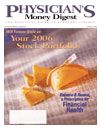Welcome the Arrival of the Roth 401(k)
Anew retirement plan ison the horizon that willhelp physician-investorssave for the future. OnJanuary 1, 2006, theRoth 401(k) arrives as a hybrid vehicleto build retirement nest eggs. If you arecurrently participating in a 401(k) planand have always wanted to contributeto a Roth IRA but could not because ofincome limitations, this plan could bevery beneficial to you.
Fusion of Tax Savings
Many physician-investors whocould not contribute to a Roth IRAcan now contribute to a Roth 401(k)because there are no income limitations.A cross between a Roth IRA anda 401(k) plan, contributions to thenew plan will be taken out of yourpaycheck and deposited into yourselected investment alternatives. Aswith a Roth IRA, you can also contributeafter-tax dollars to the plan.
Retirement withdrawals are tax-freeif taken after age 591/2 and at least 5years from the date of the first contribution.However, unlike a Roth IRA,withdrawals are required beginning atage 701/2, such as you would incur witha 401(k) plan or a traditional IRA.
It's important to note that if you oran employer wishes to offer the Roth401(k) plan to employees, the employermust amend their existing retirementplans. Many employers seem tobe taking a wait-and-see approach tothe Roth 401(k), which means youremployer may not offer it immediately.If you or your employer opts to offer aRoth 401(k), you'll be able to contributeup to $15,000 in 2006, plus a$5000 catch-up contribution if you areage 50 or older. Keep in mind that youwon't be able to contribute $15,000 toeach of these plans. The contributionlimit applies to both the Roth 401(k)and traditional salary deferral 401(k)sin any combination.
Tax Considerations
If your employer elects to offer theRoth 401(k) feature, you'll need toassess the benefits of this feature toyour particular situation. You may findthat making after-tax contributions andpotentially tax-free withdrawals worksfor your situation. However, there maybe some physician-investors who find itbeneficial to take advantage of reducingtheir taxable income now, eventhough future withdrawals will betaxed, but perhaps at a lower tax rate.This is a consideration you should carefullydiscuss with your financial consultantand tax advisor.
You should be aware of the Roth401(k) and become acquainted withthese general rules as they currentlystand. Your financial consultant canhelp you understand any further developmentsas final regulations arereleased. As with any retirement plan,the most important thing is to startearly and contribute consistently inorder to take advantage of compounding.It's never too early to begin fundingyour nest egg.
Joseph F. Lagowski is vice president, investments,
and a financial consultant with AG
Edwards in Hillsborough, NJ. He welcomes
questions or comments at 800-288-0901,
or visit www.agedwards.com. This article
was provided by AG Edwards & Sons, Inc, member SIPC.
